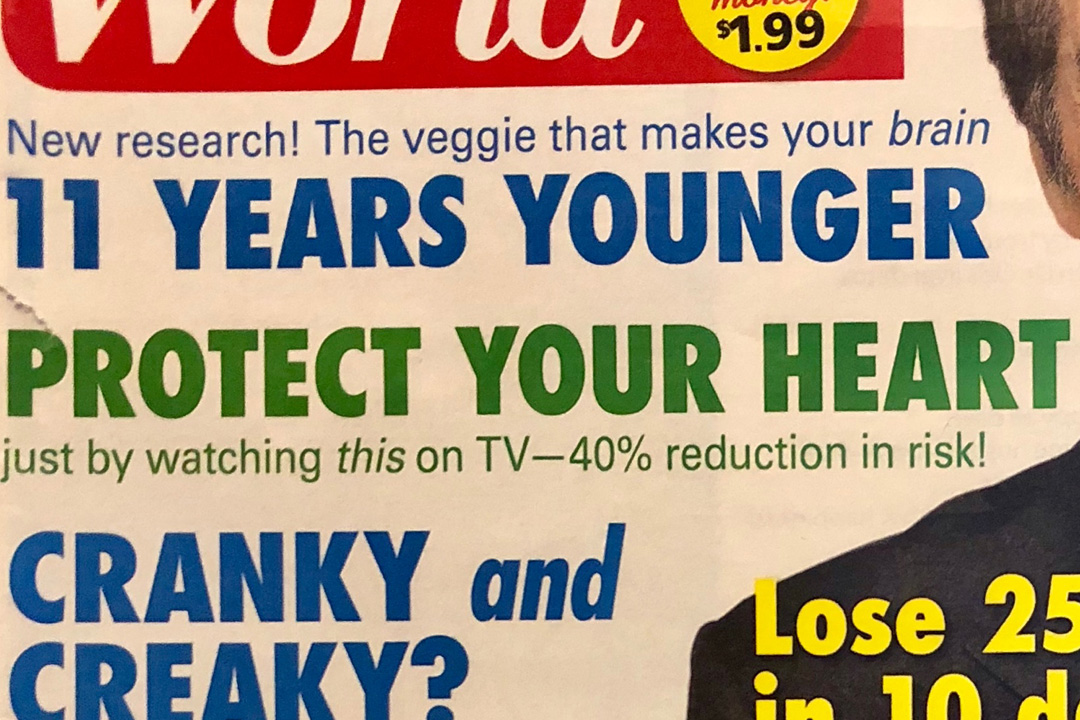
Reducing Food Waste in Foodservice
October 16, 2018 by Doreen Garelick, Dietetic Intern
Our intern Doreen attended a food waste summit for restaurants and compiled these tips to help food service operators redirect…
News Commentary
September 10, 2018

The September 10, 2018 issue of Women’s World shouts from the local newsstand, “New Research! The veggie that makes your brain 11 YEARS YOUNGER.” This headline urges readers to believe that scientists have discovered that by eating a certain vegetable you can restore your brain health to the same level it was 11 years ago. Almost anyone over the age of 50 would jump at that chance! The article even cites “a study in the journal Neurology” to support this exciting claim.
Unfortunately, a closer look at the study publication shows that this health claim isn’t actually true. The Neurology study followed 960 people who were an average age of 81, for an average of 4.7 years. During each year of the study, each of the participants completed a questionnaire about the foods they ate and took a test of their thinking and memory skills. After the study had ended, the scientists who conducted the study continued to monitor the study participants for 10 more years.
The scientists observed that the participants’ scores on the thinking and memory tests all declined over time, but that the participants who ate the highest amounts of leafy greens, specifically spinach, kale/collards/greens and lettuce, had a significantly slower rate of thinking and memory decline than those who ate the lowest amounts of leafy greens. The study concluded that, “This difference was equivalent to being 11 years younger in age.”
That’s not at all the same as the Women’s World contention that a vegetable can reverse the functional age of your brain by 11 years! One of the study scientists even noted that, “the study does not prove that eating green, leafy vegetables slows brain aging, it only shows an association.” While explosive headlines attract readers, Women’s World owes their readers accurate characterizations of scientific research to set realistic expectations about the connections between food and brain health. And as consumers, we need to read beyond headlines and check the sources when we can, to make sure we know what's true and what's exaggerated.

October 16, 2018 by Doreen Garelick, Dietetic Intern
Our intern Doreen attended a food waste summit for restaurants and compiled these tips to help food service operators redirect food waste from landfills.
Nutrition 101

Nutrition 101
September 26, 2018 by Doreen Garelick, Dietetic Intern
Ever notice headlines about rapid weightloss? Dietetic Intern Doreen Garelick looks deeper into a recent eye-catching headline to see if there's any truth behind it.
Connect
 Follow us on Twitter
Follow us on Twitter Friend us on Facebook
Friend us on Facebook Follow us on Pinterest
Follow us on Pinterest Follow us on Instagram
Follow us on Instagram Read our Blog
Read our Blog Watch videos on YouTube
Watch videos on YouTube Watch videos on Vimeo
Watch videos on Vimeo Connect with us on Linkedin
Connect with us on Linkedin Find us on Foursquare
Find us on Foursquare
Tweets by @SPEcertifiedBlog Search
Categories
SPE Certified Newsletter
Sign up for news on the latest SPE-certified venues, events and SPE updates.
We will never share your personal information with a third party.